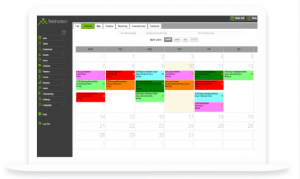At its heart, all companies need to manage customer relations.


For larger companies, the customers necessarily become more remote – you may deal with so many customers that you are not able to remember the names of most of them and you need customer relationship management software to keep on top of things.
As the company grows, it becomes important to manage your customer relations – to make sure that your sales and public relation teams are always reaching out to make sure everything is going well, to get feedback on any pain points that might have arisen, and to point out new features in your product that they may not yet be aware of. In short, you need to remind them that you exist, just like with smaller companies.
To help with this, FieldMotion has customer relationship management built right into the core. We use it ourselves to manage all of our own customers, and are constantly working to improve this.
Your sales team can use the Customers section of our core (which we call the CRM, by the way!) to set reminders of who to call, write notes about your customers and any phone calls, upload files related to the customers, create jobs related to those customers, etc. Think of it as sales rep management software.
We find the “callback” feature to be particularly useful when building up a pipeline of work or sales.
Smaller companies are usually unaware of the potential of building up a “pipeline” of work so I should explain.
When you call up a potential lead for the first time, they are probably unaware of you and just want to get off the phone. This is natural. You might have been given their number by someone that knows the CEO, or maybe an employee of the company passed on the details, or maybe it’s even just a cold-call. Either way, the first phone call is usually a dud.
For inexperienced sales people, this is the end of the line. They got rejected, they give up on that number and go onto the next.
However, if you ask “Can I call back in two weeks? Give you a chance to look us up?” (example – your wording will vary), then they are likely to say “Yes”. You then set a callback for yourself for two weeks from today, and a note about the call.
Two weeks later, you call them back and are able to say “Hi, we were talking two weeks ago, on the 17th, and I was wondering if we could go a bit further today”. You’ve established a small link with the company and are now able to talk a little about what you do.
The process is slow, but each phone call brings you closer to a sale. Every company and product is different, so it’s hard to put a figure on it, but if you read what sales people say online about it, you find numbers such as ten phone calls to get a face-to-face meeting, and ten more calls to get a sale.
If you are constant about it, you find that eventually your callbacks work out and you are getting a constant stream of sales.
It’s important that even if the pipeline looks like it is full of deals that will close soon, you are consistently adding new potentials to it.
Imagine the scenario: let’s say you have 20 jobs to do in the coming month and you think you’ll be so busy making money that you can’t make any phone calls. Does this make you happy? Well, it shouldn’t. Because you have been unable to make any phone calls, the month afterwards will not have as many jobs to do. Your pipeline will have stalled, and it will take another few months to get it back up and running.
You need to be constantly working on all three parts of the deal – qualifying leads to convert them to potential sales, then working on potentials to bring them to the sale, and finally making the sale and doing to work.
Even after a sale, you’re not finished.
You now need to set callbacks to follow up on the work and make sure the customer is happy. Call a month later. Call six months after that. Whichever schedule makes sense to you.
Not only does this keep the customer happy that you are on top of their business and making sure everything is well, but it also keeps your company on the tip of their tongue. If they are asked for tips on who to go to for similar work, they will mention you – especially if you do good work and are constantly checking in with them.
All of the above is easy to do through FieldMotion, and it doesn’t matter what industry you are in.
While our core business is field service management, the CRM part of our system is powerful and flexible enough to cater to all businesses.
Give us a call about our CRM, and we’ll talk you through how we work.


